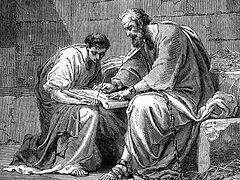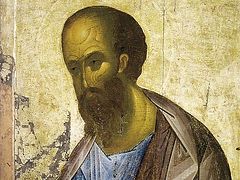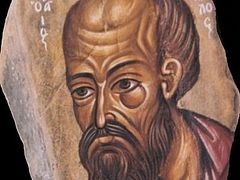A great distance separates us from Biblical times. And the words familiar to us to this day from Church life sometimes sound somehow different on the pages of the Bible. In the Psalter we read, The godly man1 has failed (Ps. 11:2). Who is a godly man? Basically anyone would say, “It is a saint who shone forth in the monastic life.” In our Church calendar we find a whole host of venerable fathers and mothers. That is so, but the verses of the Psalter were written many centuries before the appearance of the first venerable monastics (St. Anthony the Great, Mary of Egypt). To fail in venerable monasticism was impossible in Old Testament times. The phrase “godly man” [“prepodobnii”—O.C.] in the psalm indicates the most ancient revelation: God created man according to His image and likeness (Gen. 1:26). The Psalmist calls “prepodobnii”2 that man who tries not to distort the image of God within him through sin. On the contrary, he strives all the more to resemble his Creator.
When we magnify a holy monk as prepodobnii, we confess that through podvigs he achieved a wonderful likeness to God Himself. We do not call married people (such as St. Alexei Mechev) “venerable,” but “righteous,” although we are not denying that they became like unto God. How can it be denied? It’s just that they are not counted among the prepodobnie (in the strict sense of the word) fathers. The word “prepodobnii” has several meanings. The word has a rich history. Looking back at this history, we note the continuity between the life of the people of God in antiquity and now. On the other hand, the difference in the usage of the word between then and now is obvious. And this is not the case only with the concept of “prepodobnii.” I was reminded of this when I was reading the epistles of the apostle Paul and found in them the not-so-exalted word “to boast.”
The apostle “boasts” many times. He sometimes adds that he is forced to do so. Why was he forced? Paul was not even among the seventy apostles, let alone the twelve. But now he is depicted on church iconostases in the apostles’ row in a place of honor. If it’s a big church then this row consists of twelve icons—the twelve apostles, and among them St. Paul—or rather, eleven apostles and St. Paul, who is depicted in place of St. Matthias on iconostases.
We recall that after the betrayal and suicide of Judas Iscariot, the apostles entreated God to show them the twelfth. Why did they ask him? By His Blood, the Lord redeemed a people innumerable as the sand of the sea. He established twelve apostles in His people, according to the number of the tribes of Israel. Thus, the people of God preserved a continuity with Old Testament history, both in that which is primary and that which is secondary. The apostles entreated the Heavenly Father to show them another worthy person in place of Judas Iscariot. The Lord indicated St. Matthias. He was proclaimed the twelfth apostle. St. Paul did not yet believe in Jesus Christ at this time, and was not yet appointed to his high ministry. St. Paul is now depicted in the row of the twelve apostles not because he historically belonged to the twelve. This is not the reason. There is another, exceptional glory that he acquired by his podvig.
Let’s look again at the apostles’ row on the iconostasis. The closest to Christ are the apostles Peter and Paul. They are preeminent. St. Paul was not only accounted worthy of becoming an apostle and was not only honored on par with the twelve, but is honored as one of the two preeminent apostles. Now the greatness of St. Paul is recognized by every Christian, but everything was different during St. Paul’s lifetime. He had to defend his apostolic dignity many times, and often “to boast” for apologetic reasons.
He did it for the sake of his flock, which from time to time was confused. Some powerful people came to St. Paul’s flock and explained to them: “We were with Christ when He preached in the Holy Land. We are His disciples, but who is Paul—we don’t know. He teaches strange and even unacceptable things.” With feigned importance, these powerful people laid out evidence of their high authority. St. Paul defended his calling as an apostle of Christ against these troublemakers.
It’s nothing like trivial self-praise.
Although the word “boast” still looks unusual on the pages of the New Testament… Alright, then let’s take another situation into account. There was an Orthodox Biblical scholar Bishop Cassian (Bezobrazov) who lived last century. He brought out a pattern—an inspiring pattern: When the apostle Paul “boasts,” he is displaying not his own good deeds, but those of God. That changes everything.
Even when the apostle speaks of his own action, if he “boasts,” be sure, he is showing how the strong hand of God is acting through his feeble hands. His ordinary human hands do something—that’s important, but more important is that the hand of God strengthens them. When I am weak, then am I strong, writes the apostle (2 Cor. 12:10). When a person allows God to act through him, everything turns out better.
It’s not so easy to be weak in this sense. Nothing is worth being passive, just inactive, acting like a complete fool, foisting your duties onto others’ shoulders, fully enjoying your own frivolity. To be in the thick of events and to entrust yourself into the hands of God, to unite your will to the will of God is a great art. The preeminent apostle had mastered it. That’s why his life was so amazing. From a persecutor of the Church, he became the first herald of Christ. People were astonished. Some thought it was some monstrous provocation, that St. Paul would still show himself to be an insidious enemy of Jesus Christ. But St. Paul gave all his strength to his evangelical ministry and bore his cross, “boasting” in the Cross of our Lord Jesus (Gal. 6:14).
We are used to thinking of boasting as immodest. Indeed, self-praise is a sign of vanity and a manifestation of this evil passion. We must fight against it. But there is something that is not self-praise, but something completely different, although it somewhat resembles the infamous self-praise. There is a commandment in the Bible about this: Let him who boasts, boast in the Lord (1 Cor. 1:31). This goes back to the Old Testament prophetic books.
A believer seeks to do all his deeds before the face of God. The presence of God transfigures everything, including our most ordinary activities. When the preparation of food occurs in an atmosphere of prayer, the food becomes even delicious, and by it you take in rays of love. Our entire life will flow in a different way if it is about the Lord, before the face of God. How modern man is tormented by the darkness of loneliness. But man living with God is not alone; no one casts him off! God is with him. Loneliness will never be able to suffocate a believing man. God illuminates Christians with His all-radiant face.
To boast about the Lord means to render praise unto the Lord for the good things we have managed to do, that God has blessed. This is much closer to a prayer of thanksgiving than to bragging and self-righteousness. Everything changes for the better when a man does not close up within himself, within his concerns and achievements, but opens the door of his heart to God.




